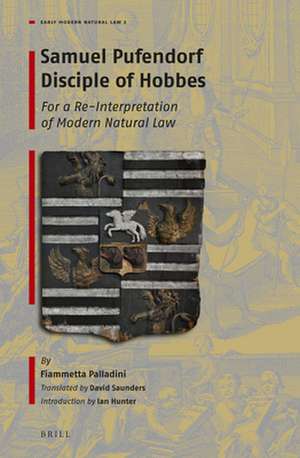Samuel Pufendorf Disciple of Hobbes: For a Re-Interpretation of Modern Natural Law: Early Modern Natural Law: Studies & Sources, cartea 2
Autor Fiammetta Palladini Traducere de David Saundersen Limba Engleză Hardback – 4 dec 2019
Translation of: Samuel Pufendorf discepolo di Hobbes. Per una reinterpretazione del giusnaturalismo moderno (Bologna: Il Mulino, 1990).
Preț: 686.76 lei
Preț vechi: 837.52 lei
-18% Nou
Puncte Express: 1030
Preț estimativ în valută:
131.43€ • 136.71$ • 108.50£
131.43€ • 136.71$ • 108.50£
Carte indisponibilă temporar
Doresc să fiu notificat când acest titlu va fi disponibil:
Se trimite...
Preluare comenzi: 021 569.72.76
Specificații
ISBN-13: 9789004388604
ISBN-10: 9004388605
Dimensiuni: 155 x 235 mm
Greutate: 0.59 kg
Editura: Brill
Colecția Brill
Seria Early Modern Natural Law: Studies & Sources
ISBN-10: 9004388605
Dimensiuni: 155 x 235 mm
Greutate: 0.59 kg
Editura: Brill
Colecția Brill
Seria Early Modern Natural Law: Studies & Sources
Cuprins
Introduction (Ian Hunter)
A note from the translator (David Saunders)
Preface
Introduction
Part One: Pufendorf the Hobbesian
I. The theory of obligation
1. The hobbesian matrix of the theory
2. The re-thinking of the hobbesian principles
II. Nature of man and state of nature: the doctrine of sociality
1. Human nature
2. The state of nature
3. The hobbesian inheritance in the doctrines of sociality and the state of nature
4. Consequences of the force of Pufendorf’s anti-hobbesian arguments relating to the state of nature
Part Two: Why did Pufendorf pass for an anti-hobbesian?
I. Pufendorf’s place in the history of ethics according to Pufendorf
II. The role of Cumberland
1. The utilisation of Cumberland
2. Differences between the first and the second editions of the De iure
3. Cumberlandian paternity of these notions
4. Incompatibility of Cumberland’s system with that of Pufendorf
5. Other variants between the first and the second editions of the De iure
III. Anti-hobbesian aspects of the Elementa
1. The social nature of man in observation 3 of the Elementa
2. How this observation is utilised and transformed in the De iure
3. The origin of civil society in the Elementa and the De iure
4. Drawbacks of the utilisation of the Elementa in the De iure
5. What relation is there, according to Pufendorf, between law of nature and utility?
6. The evolution of Pufendorf’s thought
IV. The Barbeyrac factorConclusionLeave-taking
A note from the translator (David Saunders)
Preface
Introduction
Part One: Pufendorf the Hobbesian
I. The theory of obligation
1. The hobbesian matrix of the theory
2. The re-thinking of the hobbesian principles
II. Nature of man and state of nature: the doctrine of sociality
1. Human nature
2. The state of nature
3. The hobbesian inheritance in the doctrines of sociality and the state of nature
4. Consequences of the force of Pufendorf’s anti-hobbesian arguments relating to the state of nature
Part Two: Why did Pufendorf pass for an anti-hobbesian?
I. Pufendorf’s place in the history of ethics according to Pufendorf
II. The role of Cumberland
1. The utilisation of Cumberland
2. Differences between the first and the second editions of the De iure
3. Cumberlandian paternity of these notions
4. Incompatibility of Cumberland’s system with that of Pufendorf
5. Other variants between the first and the second editions of the De iure
III. Anti-hobbesian aspects of the Elementa
1. The social nature of man in observation 3 of the Elementa
2. How this observation is utilised and transformed in the De iure
3. The origin of civil society in the Elementa and the De iure
4. Drawbacks of the utilisation of the Elementa in the De iure
5. What relation is there, according to Pufendorf, between law of nature and utility?
6. The evolution of Pufendorf’s thought
IV. The Barbeyrac factorConclusionLeave-taking
Notă biografică
Fiammetta Palladini graduated in Philosophy at the University of Rome – La Sapienza in 1965. Until her retirement she was Primo ricercatore at the National Council for Research, Rome, based in Berlin. She has published several books and many papers on Samuel Pufendorf, on Jean Barbeyrac, and on 17th century moral and political philosophy, including Discussioni seicentesche su Samuel Pufendorf (1978), Samuel Pufendorf discepolo di Hobbes (1990), La Biblioteca di Samuel Pufendorf (1999), and Die Berliner Huguenotten und der Fall Barbeyrac (2011).
David Saunders is Emeritus Professor, Griffith University, Australia. An Oxford graduate with a 1973 Grenoble doctorate in Italian, his works include Anti-lawyers: Religion and the Critics of Law and State (1997), “The natural jurisprudence of Jean Barbeyrac: translation as an art of political adjustment” (Eighteenth-Century Studies, 2003) and, co-edited with Ian Hunter, Samuel Pufendorf, The Whole Duty of Man According to the Law of Nature (2003).
Ian Hunter is Emeritus Professor, Institute for Advanced Studies in the Humanities, University of Queensland. He was awarded his doctorate by Griffith University in 1987, and is the author of various works on natural law and the history of political thought. These include Rival Enlightenments (2001), The Secularisation of the Confessional State (2007), “Public Law and the Limits of Philosophy” (Critical Inquiry, 2018) and, co-authored with David Saunders, “Bringing the State to England” (History of Political Thought, 2003).
David Saunders is Emeritus Professor, Griffith University, Australia. An Oxford graduate with a 1973 Grenoble doctorate in Italian, his works include Anti-lawyers: Religion and the Critics of Law and State (1997), “The natural jurisprudence of Jean Barbeyrac: translation as an art of political adjustment” (Eighteenth-Century Studies, 2003) and, co-edited with Ian Hunter, Samuel Pufendorf, The Whole Duty of Man According to the Law of Nature (2003).
Ian Hunter is Emeritus Professor, Institute for Advanced Studies in the Humanities, University of Queensland. He was awarded his doctorate by Griffith University in 1987, and is the author of various works on natural law and the history of political thought. These include Rival Enlightenments (2001), The Secularisation of the Confessional State (2007), “Public Law and the Limits of Philosophy” (Critical Inquiry, 2018) and, co-authored with David Saunders, “Bringing the State to England” (History of Political Thought, 2003).





